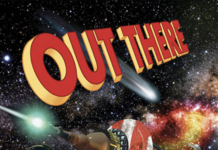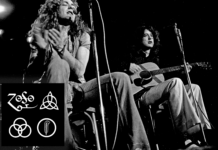For those of us with memories going right back to the seventies, there are certain images which help define what was, in many instances, a tumultuous decade .. two particularly significant ones are Johnny Rotten sneering at the camera and the androgynous David Bowie fellating Mick Ronson’s gold-topped Les Paul guitar onstage. But for those music fans whose tastes didn’t encompass the mainstream, one image which stands out is Rick Wakeman onstage, surrounded by a phalanx of keyboards, long blond hair down to his chest and wearing a sparkling glittery cape while helping Yes move towards mega-stardom.
Everyone knows Rick Wakeman! To many members of the general public, he’s that grumpy, long-haired old rock star who tells cringeworthy ‘jokes’ and stories and makes them funny. But to the prog rock community, he’s one of the most prodigiously talented, original and flamboyant keyboard players the UK’s ever produced and, with Keith Emerson and Jon Lord, he helped to write the book about keyboards in rock in the 1970s. His contribution to prog rock with Yes cannot be understated as, without his keyboard virtuosity, Jon Anderson’s ethereal lyrics would have made even less sense!
Wakeman’s total recorded output in the seventies includes bands, as a solo artist, a couple of film scores and numerous sessions for friends like David Bowie, performing on several tracks on ‘Hunky Dory,’ (he’d previously played Mellotron on Space Odyssey) was prodigious. He began the seventies in folk-Rock band The Strawbs, with whom he recorded two album’s, and in 1971 he was presented with a dilemma .. accept Bowie’s invitation to become a Spider From Mars or audition for Yes. He chose the musically more adventurous route and recorded six albums in two spells with the band, including the epic prog rock album 1972’s Close To The Edge, consistently voted as one of the greatest prog albums ever recorded. But disenchantment with Yes’ musical direction, however, led him to leave in 1974, after Tales From Topographic Oceans, which he believed contained “far too much padding” for a double album.
But whilst in Yes he began writing the music which would become The 6 Wives Of Henry 8th in 1973, but the pressures involved in raising the finance to perform solo shows, along with his alcohol excesses, led to Wakeman suffering a minor heart attack in July 1974 after a gig at the Crystal Palace Bowl. He rejoined Yes, recording Going For The One (1977), stating they should have released this album rather than Topographic Oceans, and Tormato (1978) with the band before leaving again in 1980 due to .. yes, “musical differences!” (his ins and outs with Yes and collaborations with other band members inside various musical aggregates would continue for a couple more decades, and would even include his son Adam Wakeman, who also played with Yes!) The story of Wakeman and Yes is a book on its own!
As Geoffrey Feakes’ book makes clear, Rick Wakeman’s music throughout this decade was nothing if not ambitious, sometimes to his own detriment. He chose adventurous titles and themes and his solo albums resounded with orchestration, with classically trained musicians gradually coming to realise this long-haired guy really knows how to play. Feakes was even in the audience for a performance of Journey To The Centre Of The Earth, sitting behind two members of Yes, so he writes from experience.
But Wakeman’s ambitions were also financially prohibitive and, on a tight budget, the cost of staging and touring epic productions, such as 1974’s Journey To The Centre Of The Earth, which reached no:1 in the charts, eventually left him in debt to the tune of £350,00 in the mid-1970s.. almost two million in 2023.. meaning he had to sell two vintage Rolls-Royces and re-mortgage his house up to the hilt to avoid bankruptcy. Nobody can say Wakeman didn’t suffer for his art.
Rick Wakeman was involved in releasing a total of nineteen albums during the seventies, under his own name or in a band, and whilst in a few instances, the quality wasn’t quite what it might have been, nonetheless his ambition is to be applauded because the seventies was a golden time for Wakeman, where he made his name with some stellar music, and Geoffrey Feakes’ very informative book will take you through all the ins and outs of how he pursued and achieved it.



















